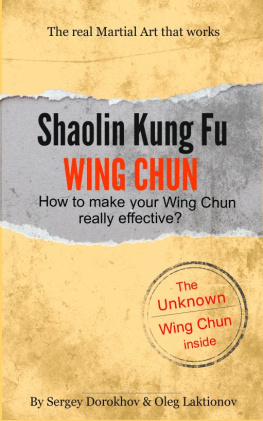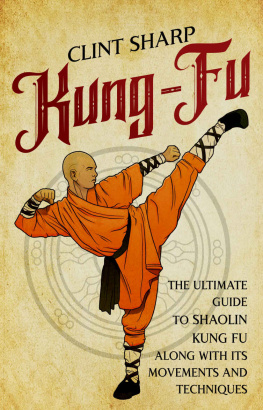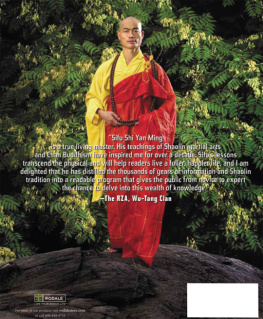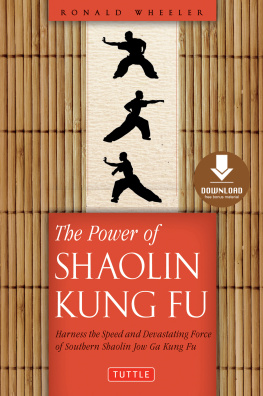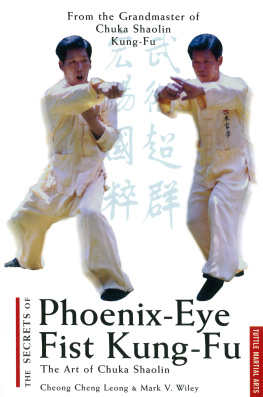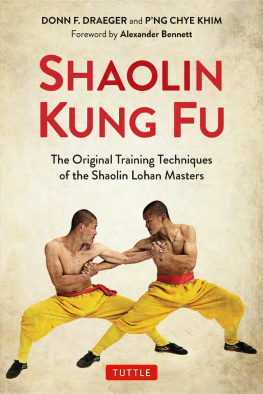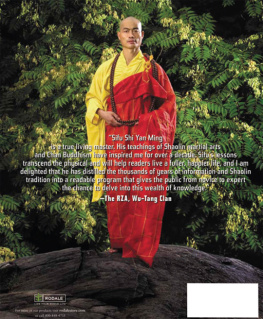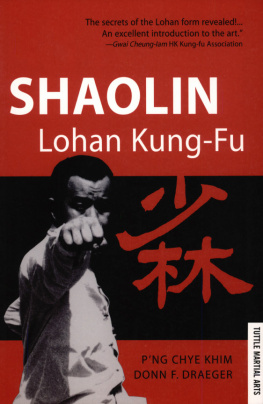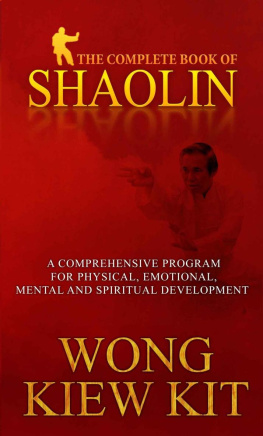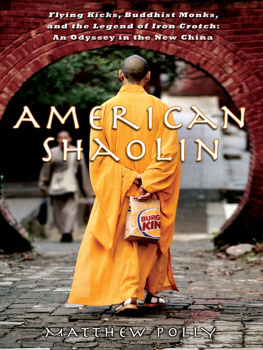
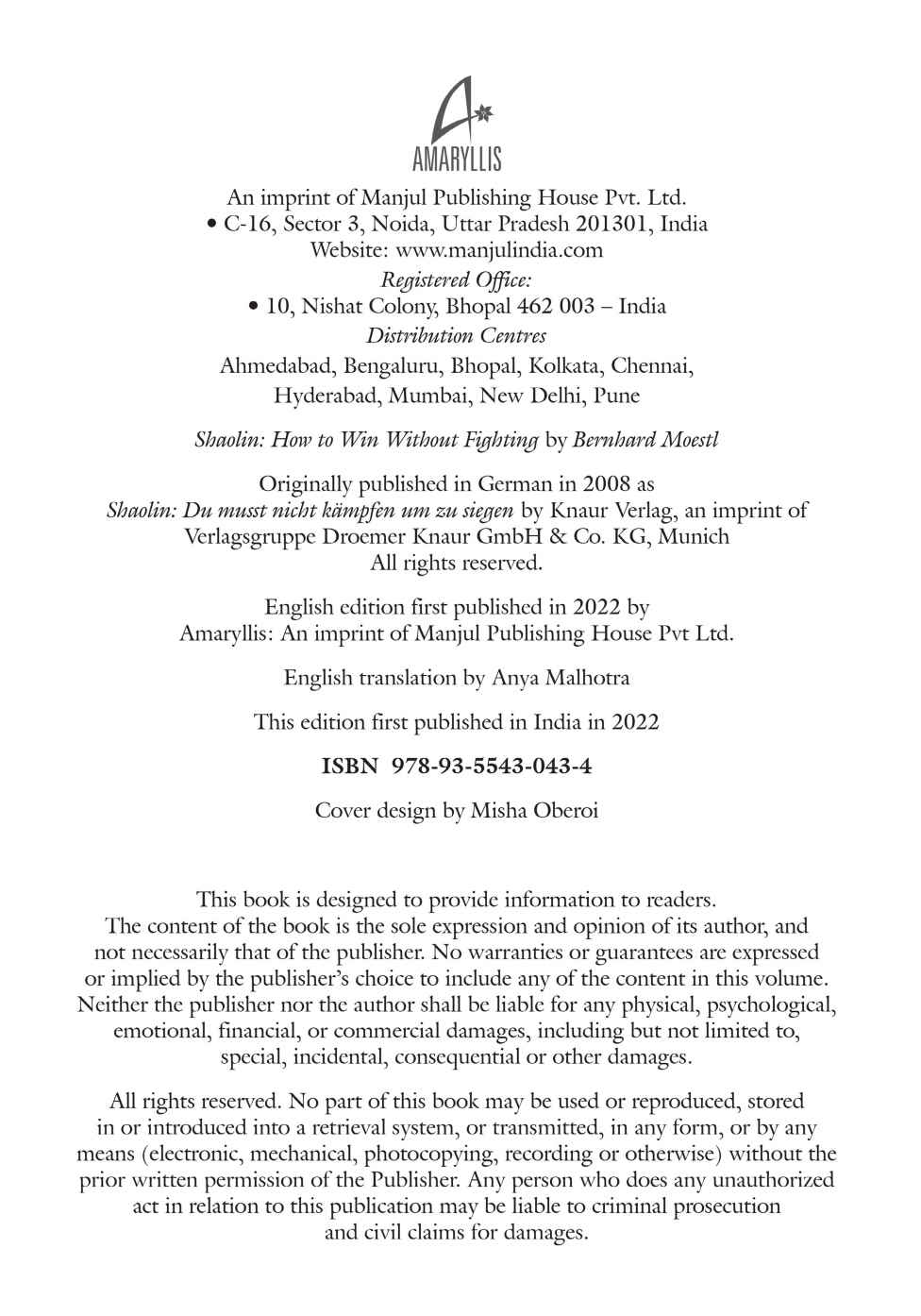
Contents
Foreword
Dear readers,
In the very heart of China, not far from the provincial capital Zhengzhou, lies the village of Shaolin. It may be small but its fame rivals that of the worlds leading cities.
Ever since the Indian monk Bodhidharma established a Buddhist monastery here over 1500 years ago, myths have sprung up around this temple and its inhabitants, who are acknowledged as the invincible masters of unarmed close combat. Many even believe that the monks have superhuman powers. For almost fifteen centuries, they have been developing and perfecting the art of Shaolin kung fu.
Yet, you would be wrong if you believed that the teachings of Shaolin are essentially about fighting. Those who leave the monastery as Shaolin masters have long progressed beyond this idea. They have learnt to be aligned with their body, to respect and to use it.
They have internalised that it is their mind that energises the bodyor weakens it. They have learnt that through their mind they have control over themselves and their surroundings, and that it is the mind alone that makes them invincible. Even mild anger uses up unnecessary energy that could be employed more gainfully elsewhere.
With this book, Bernhard Moestl has made it his mission to give you an insight into the Shaolin monks way of thinking. Through thirteen life principles, he explains how you can avoid fighting and still win; and how you can cope with the hectic pace, stress and demands at a professional and personal level in a better way so your life is filled with energy and vitality.
You do not need to be a monk or live in a monastery to successfully apply these principles. You can apply them in all situations, irrespective of where you are. You must only be ready to face up to yourself, your abilities and your attitudesand also to change these where needed.
Changing your way of thinking is not something that happens overnight. Every change needs time. Do not expect miracles from yourself, but also do not give up quickly.
Follow the Shaolin monks and find your personal path to peace, clarity and inner strength.
Gerhard Conzelmann,
President, International Shaolin Institute (regd.)
When you have the intention to renew yourself, do it every day.
Confucius
Introduction
The art of war teaches us to rely not on the likelihood of the enemys not coming, but on our own readiness to receive him; not on the chance of his not attacking, but rather on the fact that we have made our position unassailable.
Sun Tzu, The Art of War
How this book works and how you can benefit most from it
First of all, a very warm welcome! Its wonderful that you are here! Its also wonderful that you wish to change yourself. I dont know about you, but for me Shaolin has always embodied a dream. For over 1500 years, this monastery has been inextricably linked with the art of unarmed combat and with the legend of invincibility.
When I was a child, I couldnt wait to master this legendary form of martial arts. At first, simply so that I neednt fear anyone ever again. Later, it was the incredible knowledge of its practitioners that captivated me. Many sayings of the old masters have since stayed with me through my life. In my countless conversations with the monks, I finally understood that one must learn to fight so well that at some point one no longer needs to fight at all. Then it is time to face ones biggest opponent: oneself.
Change needs time
This book is divided into thirteen stand-alone chapters. Each is complete in itself and can be worked on individually. However, since there is a thematic progression in the topics, you should try and keep to the sequence as far as possible. The Shaolin principles are intended not simply for reading but as a workbook. Just as one cannot learn kung fu overnight, it is also not possible to profoundly change oneself in a matter of days. The thirteen principles must become so ingrained as to become second nature, similar to fighters internalising their technique. If there is something you do not understand, dont skip it; read it once again.
For deriving maximum benefit from this book you will also need an empty notebook. Please buy an especially nice one, perhaps with an attractive cover, and write your name on it in big letters.
This notebook will be your very own personal companion, and it will know a lot about you by the end. It will contain your jottingsand they should remain just that. Within the book and at the end of every chapter, you will find several exercises and questions. Please write the answers to these in your notebook. Its best if you dont do this randomly but exactly at those places where I ask you to do so. Often we will need the answers as we proceed. It is very important to be absolutely honest while answering the questions. Write down things as they truly are. No one besides you will read the answers.
The Turkish general Mustafa Kemal Atatrk once said, When taking stock of a situation and evaluating measures, do not, even for a moment, avoid seeing the truth even if it is bitter. If you work your way through this book again sometime later, you will see that your answers have changed. This book will not offer you pat solutions such as, If this was your answer then you must do this or that. I, too, will not be judging your answers. You can expect to gain many insights into your own behaviour, but no rules. The change must come from within you.
Ultimately, the biggest challenge in life, as Paul Gauguin said, is to overcome the limitations within yourself and to go further than you yourself could ever have imagined.
Consider this book a journey to discover your innermost self, your friends and enemies, your potential, your limitations and much, much more. It will be my pleasure to accompany you on this journey. Lets go!
Part One
Learn to Stand
He who would learn to fly one day must first learn to stand.
Chinese proverb
Never wait until you have the time.
Chinese proverb
1. The Principle of the Present
Do not lose yourselves in the past Do not run after the future The past no longer is The future has not yet come Live in the here and now.
The Buddha
Learn to live in the here and now and become conscious of transience.
Ill catch up with everything once Ive finally retired. Its just another twelve years, I simply have to hang in there until then. Does this sentence sound familiar to you? The idea that life at the moment isnt yet perfect but that it will become better in the foreseeable future? During the week do you live for the weekend and on weekends dread the working week ahead? And during all the other weeks of the year do you live for your holiday, or even for retirement, when you plan to finally do all those things that you believe you have missed out on?
Lets be honest: how often have you postponed doing things that you really wanted to do? Perhaps out of consideration for others, perhaps because the moment wouldnt have been suitable or because well, why actually? And how often have you gone ahead later and done what you once found so important? Not often, I hear you say. To be honest, hardly ever. How often have you said to yourself, Its amazing that I am where I am just now; I love doing what Im doing; its wonderful that I have this life. What happened yesterday doesnt matter. It doesnt matter what the next day, the next hour, the next minute may bring. Its just wonderful that this very moment exists, and that Im allowed to experience it. Do I hear you saying again, Not often! To be honest, hardly ever?
Next page

